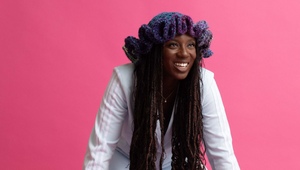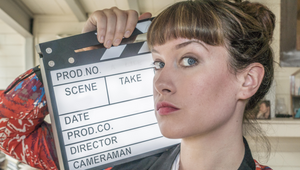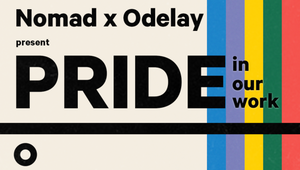
LBB Film Club: Pappa

Marcus Storm, repped by Odelay Films, is a Swedish-born and London-based director, his background being in documentary filmmaking. Marcus’ art captures and explores delicate everyday subjects through intimate interviews and cinematic visuals.
Such is his latest short, ‘Pappa’ - a naturalistic film with a documentary feel to it, achieved through a mix of static and hand-held shots. In ‘Pappa’, we watch a day in the life of the main character My, and more specifically her attempt at passing her drivers’ test.
What is an ordinary event for many, becomes a struggle for My, as something as simple as failing to parallel park correctly brings on a flood of emotions. We watch as she furiously fights against the memories, thoughts and sorrow, usually kept at bay after her father took his life a year ago. Through My’s emotions and reactions, the viewers get a glimpse at her inner world and story and grow to sympathise with her quickly, inevitably seeing their own struggles in hers.
Marcus says that his desire with ‘Pappa’ was to create a film that explores death and especially how profoundly suicide affects loved ones, the void it leaves behind and the questions it raises.
As My’s story progresses, she remains the main subject of the film, while we see only a fleeting memory of her father and hear her mother’s reassuring voice on the phone. Despite the failed test, My doesn’t give up just as she can’t give up trying to cope with her father’s death.
An airy, subtly infused with emotion narrative, ‘Pappa’ pulls at viewers’ heartstrings while remaining grounded in reality, with no necessity for flared drama.
LBB’s Zoe Antonov spoke to Marcus to find out more about the meaning and making of the film.
LBB> Marcus, tell me about the conception of the idea for 'Pappa' and why was it important for you to create it?
Marcus> I created a short film back in 2020 which has a big story and takes place over a long period of time. It’s about 20 minutes long and it’s quite hard to get a film into festivals especially if it’s over 15 minutes. So I decided I wanted to make a shorter short film, between 10 and 15 minutes long, with a somewhat simpler idea. That was the starting point for this project. I’ve had the idea of doing a longer project about suicide and grief so this short was a way to test the idea before moving on to do it as a feature.
LBB> What were the main inspirations for the film and what about them made you want to pick up the subject?
Marcus> Not sure if inspiration is the right word here, but an old classmate of mine committed suicide when we were around 15. Then a few years ago a relative of mine also took his life. So that theme and everything around it has in a way been with me half of my life.
One inspiration for the longer form version of this project, and that’s where the title comes from too, is a song called ‘Pappa’ by the Swedish artist Ola Magnell. He sings about his late father and it paints a vivid picture of his Dad and the hardships he went through to provide for his family. I get the picture that he might not have been the most present Dad, but he did it out of love for his family. That song had me thinking of what we leave behind when we die and how our loved ones remember us.
LBB> Tell me about the building of the main character, My, and what went into creating her personality?
Marcus> A tough question because when I try to think back to the writing process, she kind of emerged from the script when writing it. I wrote the part for Matilda as I knew she was going to play her, so I think that informed me a bit. It’s probably a mix of her, me and some other people in there.
I knew I wanted her to be sensitive and someone that’s looking for answers. She can’t stop thinking of why this happened and has a hard time letting go of things. Matilda also brought a lot of nuances to My on set so it’s a collaboration between the two of us to create her.
LBB> We see the dad in only one scene - why did you choose to depict his suicide in this way? And was the casting for him particularly important as we see so little of him?
Marcus> I remember seeing a post or story on Instagram from someone who wrote that she thought she saw her dead dad that day in someone who walked past her and that stayed with me. Even though that’s someone else looking like your dad I felt we needed to see her dad at one point. To connect more with what My’s going through and get a face of the person that’s missing in her life.
When it comes to casting I wanted someone who had a very ‘dad’ look about him and at the same time felt like a normal/average guy you see on the tube or on the street. In my book, Rikard has both of those qualities. Like you say, he also needed to look or be interesting in some way to give you an idea of what kind of character he is. I found him on this website for extras in Sweden. I was browsing through it and saved the ones I thought had these qualities.
LBB> The conversation between My and her mum is where we get the most context about the situation - what went into writing and directing that dialogue?
Marcus> Writing this script went pretty quickly except for this scene. It’s key to the film as we learn what’s happened and why My’s behaving the way she is. It took me a while because there’s a fine line between telling too much and too little. If I could, I’d probably still be tweaking this scene to this day, but at some point you kind of have to trust yourself and that what you’ve written is good. Matilda, Sara, and I met up while I was writing the script and went over this specific scene a few times. We discussed it from the point of view of their characters, what I wanted to say with it and what their thoughts were. So I did a couple of rewrites based on their feedback and what we discussed that day. It was incredibly helpful.
Directing the scene was pretty easy, Matilda who plays My is such a good actor - I think we did three takes and all of them were good. I think we might have changed a word or two for her, but other than that it’s what’s in the script. We had someone read the mother’s lines on set and then we recorded the voice for the mum in a studio a few days later. So we had the timings from set and then we played around with her lines a bit to find what felt the most natural for Sara, who plays the mother.
LBB> Why did you opt for a naturalistic style of filming, almost leaning towards documentary?
Marcus> To be honest, I just shot this in the way I shoot most things, so it was and wasn’t a conscious decision. I like the more naturalistic look and prefer watching others work with that approach and feel. It appears closer to real life when you don’t notice the lighting or camera work.
LBB> What did you film on and why did you pick that particular gear?
Marcus> We shot on an Alexa Mini and I don’t know which lenses. I always try shooting on film whenever I can, but we didn’t have the budget for that. When shooting digitally, I really like Alexa because of how the colours look and how easy it is in post-production. I’ve shot one or two projects on RED and it’s been a nightmare in post-production.
LBB> What role did sound and colour play in the film respectively and where can we see their effect most?
Marcus> The film is quite minimalistic in general and the same goes for colour and sound. The sound was really important in this one because we hear what My’s hearing except for a few times when we highlight her state of mind rather than what’s around her. She gets lost in her own thoughts in two scenes and we used a specific sound to highlight that. When she’s on the phone with her mum, we remove most of the atmosphere around her to focus on the conversation. I want the audience to focus on what she’s focusing on.
LBB> There are a few long, still shots, like where My is listening to her dad's voice note and crying - what effect were you looking for when creating these?
Marcus> Everything is so fast-paced these days so I wanted to do the opposite. I enjoy older movies where they use fewer cuts and let the viewer really take in the scene and what’s going on. This film is so much about My’s emotions and her inner struggles so that’s why almost everything focuses on her. We use a lot of close-ups to let the viewer register her reactions. That in combination with the long takes makes you feel like you’re there with her, seeing everything in real time.
LBB> What are you most proud of in this project?
Marcus> I’m most proud of the fact that it’s very close to what I had in mind when I wrote this. But also that we managed to make this with a very limited budget, and that we had so much fun shooting this. It was two very hectic shooting days to get everything in the can but thanks to everyone in the team we made it happen and I can’t thank everyone involved enough.















